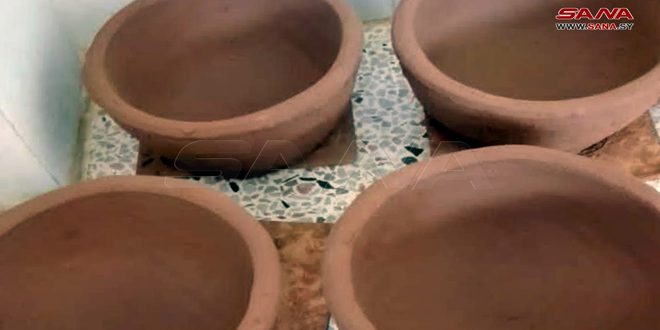Pottery making is one of the most popular traditional professions spread across all Syrian cities. This heritage industry, which dates back to more than 8 centuries, depends on the elements of the environment, such as water, soil, and salty stone.
Reham Khadouj from Sheikh Badr in Tartous countryside succeeded in adhering to the traditional heritage she inherited from her mother and grandmother and finding a project bearing the spirit of nature, the pottery pans industry that she was able to develop into a small business that supports her and her family.
Khadouj has been making pottery pans for more than 10 years with the help of her mother, Hiam Dyoub, to secure financial returns at low costs and simple materials that depend on the environment.
About the mechanism of making pottery pans, which is known as a cooking bowl, Khadouj explained that its manufacture requires a special type of dirt that is soaked with water. Then they bring a crystal stone, crush and grind it to get a soft white powder to be added to the water-soaked dirt mixture to become solid and strong. Then they crush the dirt after spreading the salt powder on it, knead the mixture, then place it on a wooden base to make a deep cavity, and thus begin the rounding phase of the pan and the mixture takes the shape of the bowl.
Khadouj explained that the next stage is the heating stage, which aims to make the pan smooth and fill the small holes in it using a small smooth stone. Then the pan is placed in the shade until it dries up. After that, the baking stage begins when the pan is placed in the oven, “Al-Tannour”until it becomes red , then it is lifted and covered with oak leaf and rubbed with a cloth to increase its softness and becomes ready for use.
As for the marketing mechanism, Khadouj sells her products in large quantities to merchants directly. The merchant, Ismail Badr, who sells pottery and household utensils, explained that he buys pottery pans of different types and sizes to market them in the neighboring countries “Lebanon and Iraq,” noting the high demand for buying these pots, especially recently where citizens and foreigners prefer to acquire crockery and focus on pottery antiques.
Mrs. Amal Ibrahim explained that cooking in a pottery pan adds a special flavor to the food, while Mrs. Heba Salman, chose to cook with pottery, as she noticed that food retained its nutrients because it does not need a long period during cooking.
Amal Farhat

